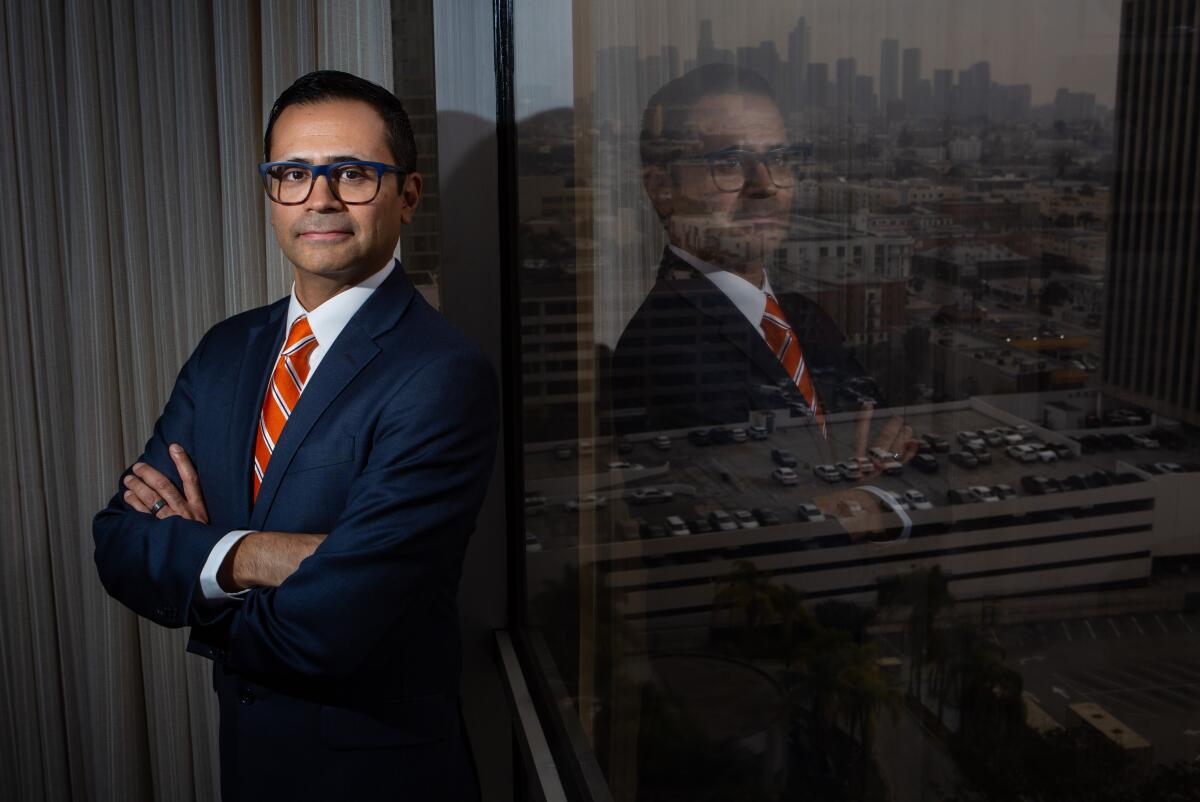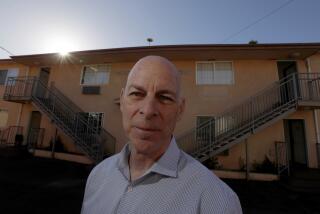First non-Jew to lead Bet Tzedek has devoted career to working with legal aid groups

- Share via
In 1974, a group of Jewish lawyers, law students and others banded together to offer free legal services out of a storefront in Los Angeles’ Fairfax district. Calling themselves Bet Tzedek, Hebrew for “House of Justice,” they spent much of their time protecting the neighborhood’s elderly Jewish residents from unscrupulous landlords.
Four decades later, the group has grown into one of the city’s leading legal aid organizations with dozens of staff attorneys and volunteers assisting thousands of undocumented immigrants, low-wage workers, homeless families and others each year.
On Friday, Bet Tzedek announced it has selected Diego Cartagena, a lawyer who oversees its legal programs, as its new chief executive. Born in El Salvador, Cartagena, 42, immigrated legally to the U.S. with his family when he was a young child. He is the first non-Jew to lead the organization.
You’ve dedicated your whole career to working with legal aid groups. Why did you go down this path?
After college, I taught at a small, low-income elementary school in Riverside. Most of the kids were children of migrant workers. That was the first time as an adult that I witnessed firsthand the impact of the legal issues these families faced. They were facing eviction, parents weren’t getting paid what they were owed, there was domestic violence. I would hear about it directly from the children ... and realized that if I was going to have the impact on their lives that I wanted to, then I needed to go down a different path. So I applied to law school.
Plenty of people go in to law school with similar intentions, but they get wooed by the big salaries private firms offer.
The summer after my first year of law school, I interned at the Los Angeles Center for Law and Justice in its family law unit. I chose it because I was thinking back to my students at that elementary school ... Something about family law just clicked for me; it all made sense, and I saw the impact I could have on my clients’ lives.
I went on to work at the center for a few years. The aspect of the job I enjoyed the most was teaching and coaching attorneys from law firms on how to help in cases. I loved the multiplier effect it had. At any given time, I could be working on 30 cases. But what if I had this army of attorneys working alongside me? All of a sudden, we’re doing so much more for the community.
The model of volunteers is interesting. We’re in a city that has no shortage of white-collar firms billing clients $1,000 an hour for the services of their attorneys and no shortage of people struggling with homelessness, immigration issues and other serious problems. As someone who has made a career of bridging those extremes, I wonder what you make of it?
It’s about harnessing their talent and harnessing their desire to use their talents to the benefit of communities that they see all around them. Everyone has a story. One lawyer will say, for example, “I volunteer for your conservator clinic because my older sister has Down syndrome and I know what my parents went through to take care of her.” Others tell us that we are the way they stay connected to their dream of working at a nonprofit as they pay off the loans they took out for law school.
I always keep in mind what my good friend David Lash, who used to run Bet Tzedek, says: We are one of the few professions that has this mandate to turn around and do good on behalf of the community.
You’re the first non-Jew to run Bet Tzedek. Is that significant?
It’s a huge honor. This is a unique place. There are a lot of agencies out there that are dedicated to justice and equal access, but Bet Tzedek has something beyond that. It is founded on these principles, these guideposts that are from the Jewish community. I learned, for example, the idea that you do not turn away a stranger who comes from a strange land. Being an immigrant, I was overwhelmed by that ... And you can see how those ideas impact this organization. Years ago, our board had a tough decision to make: Do we pursue legal services funding from the federal government? One of the restrictions on that funding is you cannot serve undocumented immigrants. It was an incredible amount of money that would have offered some stability. But it would have meant compromising this value that we hold dear. The board made a choice that it wasn’t for us and instead said, ‘We will work harder to raise the funds.’ That carries a profound sense of gratitude and inspiration for me.
In your role as vice president of legal programs, you formed a unit that helps small business owners and people looking to start a business. That seems like an unusual area for a legal aid group such as Bet Tzedek.
So often, our clients are on the defensive. They are on the receiving end of a lawsuit and we are there to help defend them. This felt like a chance to help empower people to reach economic stability and growth not just for themselves but also their community. The funding for it came from settlements in the cases the state brought in the housing foreclosure crisis. So much of that crisis impacted low-income communities, communities of color and here was an opportunity to take that and make something good out of it — to focus our energies on working with entrepreneurs from low-income areas and help them build up wealth in their communities.
It’s been wildly successful. We were hoping for 20 or so clients and each year we’ve had well over 100 ... As an example, a few years ago we had a team of volunteer attorneys work with a little grocery store owner. His lease was up and the landlord was trying to raise his rent dramatically. They came in and negotiated on his behalf.
What are you hoping to accomplish as CEO?
[Outgoing CEO Jessie Kornberg], building on the shoulders of past CEOs, has put us in this incredible position where we are very stable and our reputation in the community has grown. My focus will be on continuing to build up our programs so that Bet Tzedek is top of mind when community partners and leaders are trying to address our most pressing issues. The next time that California’s governor is putting together the master plan on aging — how California will protect our aging population — I want him or her to think of Bet Tzedek and call our elder law team to be at the table.
We are and always will be a direct services agency. But I want to think more about ways we can help to fix problems globally. The community needs that and so do our brilliant staff. When they come into my office and say, “Hey, I have this idea,” I want to make sure we are able to support them.
You’re not a black sheep in your family.
No. My brother is also a nonprofit attorney, my wife too and my sister-in-law. Our parents like to joke, “Four lawyers and not one of you can support us in our retirement.”
More to Read
Sign up for Essential California
The most important California stories and recommendations in your inbox every morning.
You may occasionally receive promotional content from the Los Angeles Times.














